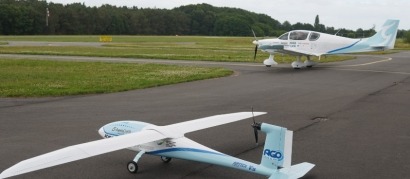
KLM and AeroDelft share the idea that air travel is essential for people and various sectors, but that innovation in aviation is vital. KLM is starting a collaboration with the AeroDelft student team in order to become part of various ecosystems around the technologies of the future, such as flying on hydrogen.
With this initiative, KLM and AeroDelft want to contribute to the development of hydrogen technology and the associated preconditions. This could include certification, regulations, and infrastructure. The technologies currently under development still face many challenges, such as the distribution and transport of liquid hydrogen.
About Project Phoenix
The aim of AeroDelft's Project Phoenix is to build a hydrogen-powered aircraft. The project involves developing a drone, the Phoenix-Prototype, which will serve as a steppingstone in the development of the first, manned, liquid hydrogen-electric aircraft, the Phoenix Full-Scale.
The Phoenix Prototype runs on an electric motor powered by liquid hydrogen and fuel cell technology. The drone has already completed its first flight, making an important contribution to AeroDelft's experience with hydrogen-powered flying. This involved testing whether the drone could fly on liquid hydrogen and if it could be controlled from the ground.
The drone serves as a starting point for the manned aircraft that will fly on hydrogen: the Phoenix Full Scale. The team has built the frame for the Phoenix Full Scale and is testing the hydrogen systems within the frame. Meanwhile, the team aims to fly their manned aircraft in 2024 using gaseous hydrogen, and later with liquid hydrogen in 2025.
AeroDelft student team
AeroDelft consists of a team of 50 students who study at Delft University of Technology. AeroDelft's mission is to prove and promote hydrogen as an alternative to conventional aviation fuels.

